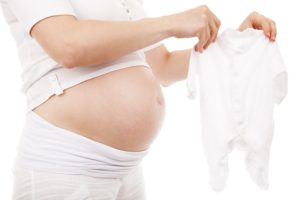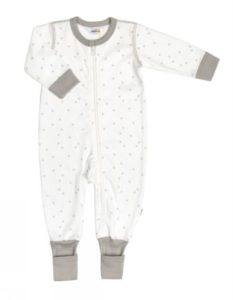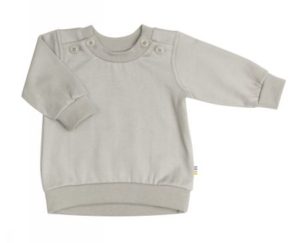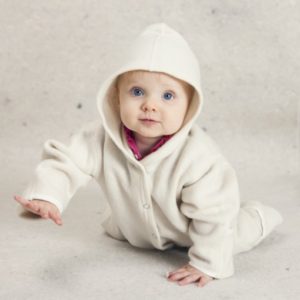 Udbuddet af økologisk børnetøj og legetøj stadig bliver større og mere populært. Hvis du er i tvivl om hvad du får for pengene, og hvordan økologisk tøj og legetøj påvirker vores børn og miljøet, har vi her samlet en række informationer til den bevidste forældre. Her på siden finder du også eksempler på forhandlere, hvor du kan finde masser af lækkert blødt økologisk babytøj.
Udbuddet af økologisk børnetøj og legetøj stadig bliver større og mere populært. Hvis du er i tvivl om hvad du får for pengene, og hvordan økologisk tøj og legetøj påvirker vores børn og miljøet, har vi her samlet en række informationer til den bevidste forældre. Her på siden finder du også eksempler på forhandlere, hvor du kan finde masser af lækkert blødt økologisk babytøj.
Vil du vide mere om økologisk børnetøj, og hvor du kan købe det, så læs med nedenfor.
Indholdsfortegnelse
Fordele ved økologisk bomuld
Økologisk bomuld er produceret uden brug af farlige kemikalier og sprøjtemidler. Det betyder, at det færdige produkt indeholde meget lidt skadelige stoffer. Det er især en fordel i tøj til børn, da børn er de mest følsomme overfor kemikalier og andet, der kan optages i huden. Kemi i tøj bliver afgivet når barnet sveder og har tøjet på. Hvis du ikke køber økologisk tøj, så er det ikke farligt for dig eller dine børn som slutbruger, men det er dog anbefalet at du altid vasker tøjet inden brug, da kemikalierne så frigives.
Derudover er en økologisk produktion meget mindre miljøbelastende, da der udledes mindre drivhusgas i produktionen.
Hvis du overvejer at købe mere økologisk, er der ingen grund til at kassere alt det tøj du har, som ikke er økologisk. Til at starte med kan du købe økologisk undertøj og strømpebukser, som sidder tæt på kroppen. Kemi osv. Bliver efterhånden vasket ud af konventionelt bomuld, så faktisk kan du også købe brugt for at undgå alle disse uønskede stoffer.
Vidste du, at...
Hele 16 % af verdens forbrug af insektgift og 10 % af verdens sprøjtegift bliver brugt i produktionen af konventionel bomuld.
Der udledes helt op til 94% mindre drivhusgas i produktionen af økologisk bomuld, sammenlignet med det konventionelle.
Kilde: Danmarks Naturfredningsforening
Økologisk tøj til børn og babyer finder du efterhånden i rigtig mange forhandlere. Du vil nok hurtigt opdage, at noget økologisk tøj koster næsten det samme som alt andet tøj, mens andet økologisk babytøj er en smule dyrere. Det skyldes, at noget at tøjet er certificeret med for eksempel GOTS mærket.
Det betyder Organic Cotton og GOTS
Dette mærke garanterer at selve dyrkningen af bomuld er økologisk, men hele fremstillingsprocessen skal leve op til strenge sociale og miljømæssige krav. Hvis tøjet blot er mærket “organic cotton” betyder det, at bomuldsmarken er dyrket økologisk, men her skal du læse butikkens retningslinjer for at finde frem til deres miljøpolitik omkring hele fremstillingsprocessen.
Meget tøj er har også mærket Oeko-Tex. Det betyder ikke, at det er økologisk men tøjet er til gengæld testet fri for alle skadelige stoffer, og potentielt skadelige stoffer. Det er derfor et godt mærke at kigge efter, når du shopper tøj til børnene. Du kan blandt andet finde økologisk tøj hos Rene-Naturprodukter og hos Svanebutikken .
Økologisk babytøj & børnetøj
Her har vi samlet eksempler på lækkert økologisk tøj til babyer og børn
Lækker og blød natdragt fra Joha i økologisk bomuld
100% økologisk bomuldsdragt til 199 kr. hos Joha
Økologisk nattøj er en rigtig god ide, da det jo ofte er direkte mod huden og barnet har det på i mange timer. Denne skønne natdragt fra Joha kan bruges både som nattøj eller som “hyggetøj”. Fordi den er økologisk er den blødere end man tror. Dragten har smarte ombuk ved ærmer og fødder, som gør at den holder længere.
Langærmet trøje med knapper i halsen
Praktisk basisbluse i lækker økologisk bomuld til 149 kr.
En skøn basisbluse, som passer fint til både drenge og piger. I halsen er der knapper, som både ser dekorative ud, men også gør det nemmere at tage blusen af og på. Blusen har ribkanter forneden og i ærmerne, hvilket gør at den har en god pasform, og nemmere holder formen efter vask. Denne bluse forhandles hos Ugleunger, hvor du finder et stort udvalg af især Joha tøj, hvoriblandt meget af det er økologisk babytøj.
Økologisk ulddragt til baby – meget blød merinould
Ulddragt i KbT certificeret økologisk og ubehandlet uld
KbT certificeringen garanterer at dyrene lever under økologiske forhold. Derudover er ulden ubehandlet, hvilket betyder at den ikke har gennemgået den kemiske proces som for eksempel superwash uld gør. Det er ikke en billig ulddragt til baby, da den koster 699 kr., men til gengæld er den det rette valg, hvis du vægter økologisk og miljøvenligt tøj.
Hvad du bør vide om økologisk bomuld
I dyrkningen af økologisk bomuld må der ikke bruges for eksempel sprøjtegifte, hvilket er en stor fordel især hvis det er økologisk tøj til børn. Børn har tyndere hud end voksne, og er derfor mere modtagelige overfor kemi og andet uønsket, end voksne er.
Der er næsten ikke noget negativt at sige om økologisk bomuld frem for konventionelt, både når vi snakker sundhed og miljø. Eneste ulempe må være, at det er en smule dyrere. Men efterhånden som udvalget bliver større, så falder priserne heldigvis også. Bomuld er generelt et billigt materiale, og du kan finde ret billigt økologisk bomuld billigt hos mange forskellige forhandlere, blandt andet Ugleunger eller Kids-World.
Hvad du bør vide om økologisk uld
Er du ude efter økologisk uld, kan du med fordel også kigge efter ubehandlet uld. I princippet er alt uld behandlet, da det skal behandles før det kan laves om til garn eller tøj. Økologisk eller ubehandlet uld har ikke gennemgået de såkaldte superwash behandlinger, hvor ulden gennemgår en kraftig kemisk proces, og derefter beligges med plastik eller harpiks så det ikke kradser. Desværre gør denne behandling også, at ulden mister en del af sine naturlige egenskaber, og så er superwash behandlingen meget miljøbelastende.
Derfor er økologisk tøj og legetøj så populært
Økologi har haft en enorm fremgang inden for de seneste år, og ikke kun inden for mad og kost, men i særdeleshed også indenfor produkter som legetøj og tøj til børn og babyer.
Når man handler økologisk, er der mange mærker at holde styr på, og derfor har vi her skrevet kort om de forskellige mærker som handler om økologi eller om tøj generelt.
GOTS certificering og hvad den betyder
Er produkterne tilmed GOTS certificeret, kræves det at arbejderne har ordentlige forhold som blandt andet adgang til et rent toilet og en ugentlig fridag. Tvangsarbejde og børnearbejde er ligeledes forbudt hvis produktet skal være godkendt til GOTS. Når du køber økologisk bomuld, får du et produkt uden kemikalier og sprøjtegifte. Men det økologiske bomuld gør også en stor forskel for de markarbejdere, der tilbringer mange timer hver dag i bomuldsmarken. Ofte bor de tæt ved marken, og dyrker deres egne afgrøder i jorden. En økologisk bomuldsmark er uden skadelig kemi, så arbejderne ikke udsættes for dette dagligt.
- Der bruges ingen sprøjtegift i dyrkningen af økologisk bomuld
- Energi- og vandforbruget er markant mindre end ved konventionel bomuld.
- Økologisk bomuldsdyrkning udleder op til 94 % mindre drivhusgas (!) end konventionel bomuld
- Alle kemikalier skal leve op til strenge krav om giftighed og nedbrydelighed
- De ansatte lever og arbejder under langt bedre forhold (de udsættes ikke for sprøjtegifte
Kilde: GOTS officielle side
Oeko-Tex certificering og hvad den betyder
Selvom det lyder sådan, er Oeko-Tex mærkningen ikke en garanti for, at produktet er økologisk. Til gengæld er har produktet fået denne mærkning fordi det er testet fri for alle stoffer og kemi, som er skadeligt, eller mistænkes for at være skadeligt. Oeko-tex er især vigtigt når det kommer til for eksempel regntøj og overtøj, hvor man desværre har set tidligere eksempler på at tøjet har indeholdt stoffer der ikek er så hensigtsmæssige at have nær kroppen.
Kilde: Den oficielle Oeko-Tex side
Derudover er der også meget bomuld på markedet, der hedder ”organic cotton”, som sælges til en meget lav pris. Dette bomuld er dyrket på økologiske bomuldsmarker, men der er ikke nogen garanti for resten af fremstillingsprocessen. Her er du nød til at læse de enkelte forhandleres miljøpolitik, hvor du kan finde deres holdning til miljø, og hvordan deres fremstillingsprocesser er.






